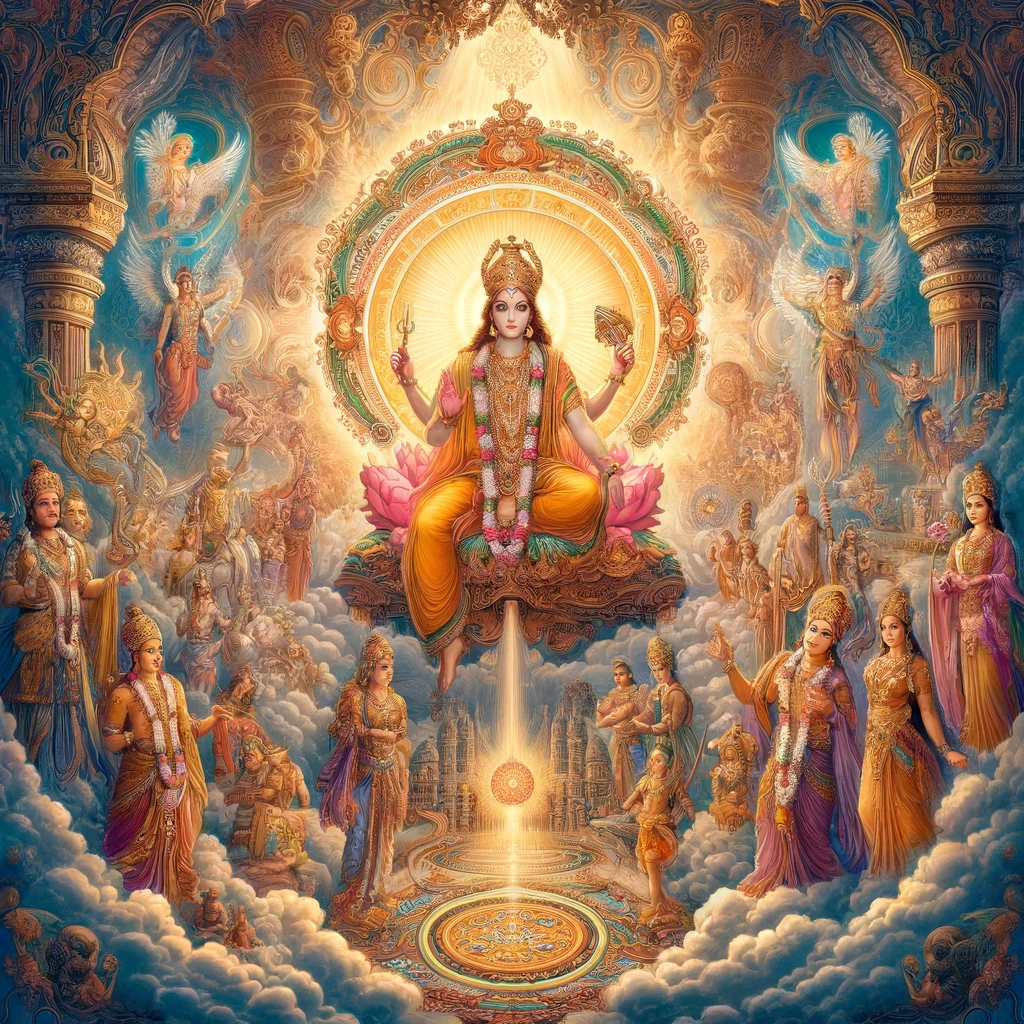ಅಮೃತ್ಯುಃ ಸರ್ವದೃಕ್ ಸಿಂಹಃ ಸಂಧಾತಾ ಸಂಧಿಮಾನ್ ಸ್ಥಿರಃ
amṛtyuḥ sarvadṛk siṃhaḥ saṃdhātā saṃdhimān sthiraḥ
ಅಜೋ ದುರ್ಮರ್ಷಣಃ ಶಾಸ್ತಾ ವಿಶ್ರುತಾತ್ಮಾ ಸುರಾರಿಹಾ (204-213)
ajo durmarṣaṇaḥ śāstā viśrutātmā surārihā ||22||
amṛtyuḥ (ಅಮೃತ್ಯುಃ)
God is beyond death. Another name for death is ' apasmṛti (ಅಪಸ್ಮೃತಿ),' which means forgetfulness. God has transcended death. Even other gods and celestial beings experience death before attaining liberation. For us, death itself is the path to liberation. After going through numerous deaths, the proximity of liberation, free from death, is attained through God.
sarvadṛk (ಸರ್ವದೃಕ್)
Nothing remains unknown to God. He is the seer of all things. He bestowed upon us the power to perceive this world. Witness and all-seeing imply the same meaning. Thus, the all-seeing God can perceive everything.
siṃhaḥ (ಸಿಂಹಃ)
The lion symbolizes the ultimate destroyer. He annihilates anything that is unwanted to us. We do not truly know what we need. God, knows our desires, however it may differ greatly from our own. Even though we may suffer from various ailments, we still have a desire to live. However, in this situation, death is the true blessing. The soul, residing within this physical body and struggling for its independence, naturally seeks to return to its innate state. Death is thus the natural process of returning the soul to its original state. If the destruction of this elemental body does not occur, we cannot attain liberation. However, suicide is a grave sin. For the great souls, the saints residing in the Himalayas, the act of renouncing the body is an extremely natural and blissful process, and they are aware of their date of death. Swami Rama has mentioned this in his book "Living with the Himalayan Masters." Worshiping Lord Narasimha, the form that eradicates our faults, is prescribed in the scriptures. Thus, the lion represents the destroyer of all faults, the destroyer of life, and the supreme symbol of courage.
saṃdhātā (ಸಂಧಾತಾ)
In the Vedas, you can find names like Dhaataa, Vidhaataa, Sandhaata, and others. Here, 'Dhaataa' refers to the power that nourishes us. Sandhaata means the one who holds everything, the embodiment of great compassionate nurturing, sustaining everyone.
Furthermore, Sandhaataa also signifies the act of joining or connecting. It denotes the power of the divine that has systematically arranged and connected all the planets and celestial bodies that are visible and invisible to our eyes, stretching far beyond the measurable limits of the universe. This power, known as Sandhaataa, is responsible for harmoniously orchestrating and sustaining everything in the boundless sky.
saṃdhimān (ಸಂಧಿಮಾನ್)
The unique arrangement of the 360 joints in our body, the remarkable coordination and execution in the movement and functioning of the skeletal system, is the manifestation of the divine principle of Sandhimaan (the embodiment of joints). Through the combination of various sounds, the formation of words occurs; through the combination of words, sentences are constructed; and through the combination of sentences, scriptures are created. In this way, the divine principle of Sandhimaan brings forth new meanings of words and the creation of scriptures through the convergence of letters. Additionally, in the union of male and female, the divine principle of Sandhimaan is present, being the cause behind the creation of life.
sthiraḥ (ಸ್ಥಿರಃ)
The unchanging Lord, who is not subject to childhood, youth, or old age, is unwavering. He is steady and filled with eternal bliss. Thus, the Lord is steadfast, immovable, and abounds everywhere.
Ajah (ಅಜಃ)
Ajah means one who is never born. Everyone is a child of God, but He is not born of anyone. The discussion about the birth of God is like the debate about 'which came first, the seed or the tree?' He has no father because He is beyond birth and death. Furthermore, Ajah also means one who pervades everywhere. A+ja-Ajah. Here, 'a' means 'not' or 'no'. That is, He is none of the things we know, He has no imperfections. 'Ja' means 'generator' or 'father'. God is the father of everyone.
Durmarshanah (ದುರ್ಮರ್ಷಣಃ)
'Marshana' means the power to resist any kind of opposition. Durmarshanah refers to a force that is impossible to obstruct. There is no power that can impede or stand against God. The omniscient nature of His blissful essence overflows and pervades everywhere, and it is impossible for anyone to contain or hinder it.
Shasta (ಶಾಸ್ತಾ)
'Shasta' refers to the one who imposes discipline, the one who governs the lives of beings according to their actions. In the divine law of God, there are specific explanations for truth, falsehood, violence, non-violence, righteousness, and unrighteousness. A lie told for the welfare of others is truth! A truth that causes trouble to others for one's own selfish reasons is a lie! An act done with good intentions is righteousness. The violence enacted in the pursuit of self-preservation or national defense is non-violence! Many such instances of God's unique laws can be seen in the Mahabharata or during the Krishna avatar. At first glance, Krishna appears to have encouraged deceit or trickery, but behind many such events lies the compassionate intention of the Divine. Thus, God, as the 'Shasta,' has set forth these teachings and real-life examples for us to follow.
Vishrutatma (ವಿಶ್ರುತಾತ್ಮಾ)
'Vishruta' means one who is heard of by everyone. God is Vishrutatma, known throughout all the scriptures and intimate to the wise as the Universal Soul
Surarihā (ಸುರಾರಿಹಾ)
'Suraru' refers to those who live in bliss or in the awareness of the Divine. Enemies of the 'suraru' are 'surari. Those who, aware that there is nothing beyond pleasures and fortunes, lack the true knowledge of bliss, are called 'surari’. God is the one who destroys these enemies of the divine beings, leading them away from the path of mere sensory indulgence towards the cessation of the cycle of death and rebirth is know as ‘Surarihā’.


